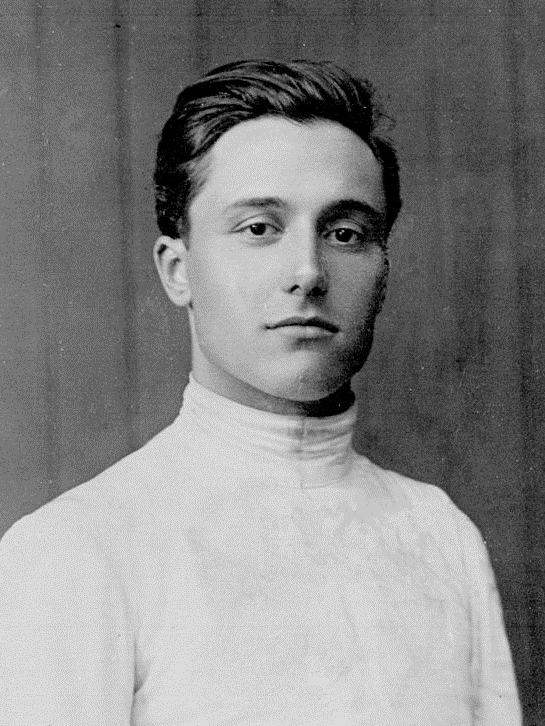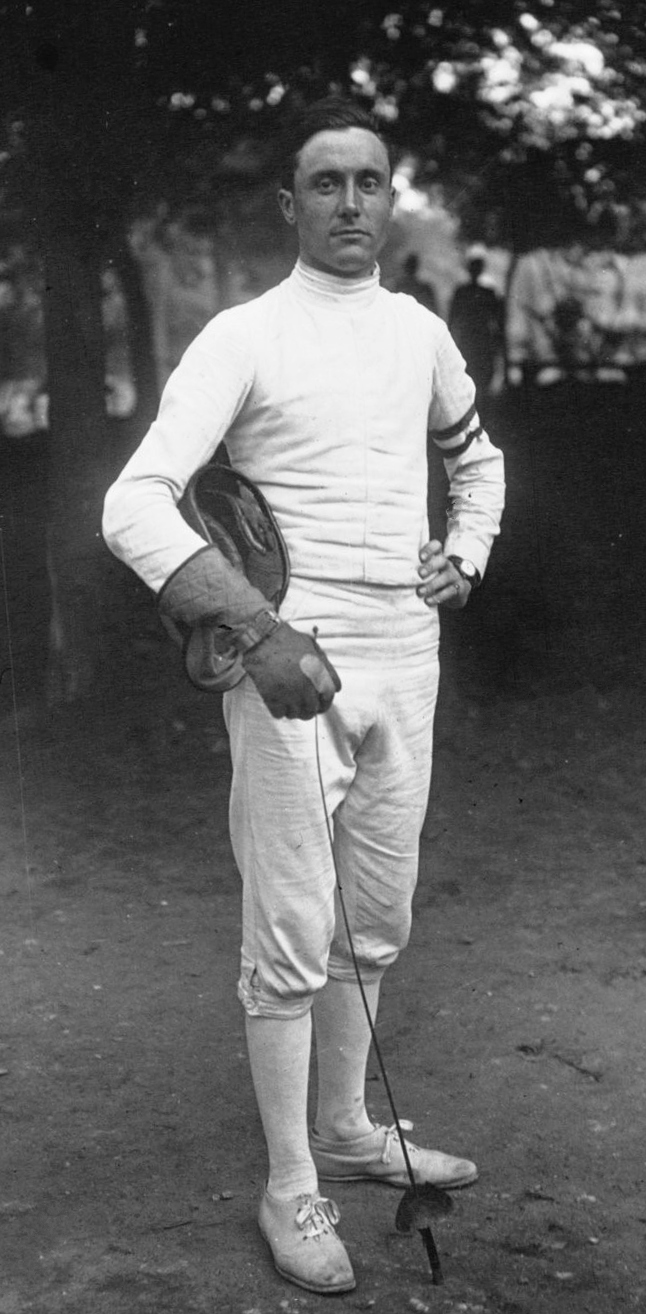1. Early Life and Background
Nedo Nadi's early life was deeply rooted in the world of fencing, influenced by his family's esteemed tradition in the sport.
1.1. Childhood and Introduction to Fencing
Born in Livorno, Tuscany, Italy, Nedo Nadi was the elder son of Giuseppe Nadi (also known as Beppe Nadi), a renowned Italian fencing master. His younger brother, Aldo Nadi, also became an Olympic gold medalist in fencing, showcasing the family's exceptional talent. Standing at 6.2 ft (1.88 m), Nedo received his first fencing lesson with a foil at the tender age of seven in his father's gymnasium in Livorno. While his father diligently taught him the techniques of foil and sabre, he held a strong disapproval for the épée, considering it an "undisciplined" weapon, and consequently refused to instruct his sons in its use. Despite his father's stance, Nedo and Aldo, driven by their passion for the sport, independently pursued practice with the épée. They would often go to practice on their own, becoming essentially self-taught in the weapon.
1.2. Early Activities and Achievements
Nadi demonstrated exceptional skill and promise from a young age. At just fourteen years old, he earned a solid silver trophy for his proficiency across all three weapons during the Jubilee celebration held in Vienna for Emperor Franz Joseph I. This early achievement foreshadowed his future dominance in the fencing world.
2. Olympic Career
Nedo Nadi's Olympic career was marked by extraordinary success, culminating in a historic performance in 1920 that set him apart from all other fencers.
2.1. 1912 Stockholm Olympics
Nadi made his Olympic debut representing Italy at the 1912 Summer Olympics in Stockholm. At the age of 18 years and 29 days, he became the youngest fencer ever to win a gold medal in the individual foil event. In the final pool, he secured the gold medal with seven consecutive victories, overcoming competitors such as his teammate Pietro Speciale and Richard Verderber of Austria. Beyond his gold medal, Nadi also participated in the sabre individual and team events, where he secured a fifth-place finish in both.

2.2. World War I Service
The 1916 Summer Olympics, planned to be held in Berlin, Germany, were canceled due to the outbreak of World War I. During this period, Nadi served in the Italian Army and was recognized for his courage, receiving military decorations for bravery. His military service led to a temporary interruption in his competitive athletic career.
2.3. 1920 Antwerp Olympics
Following the end of World War I, Nadi resumed his competitive fencing career. The 1920 Summer Olympics in Antwerp saw the absence of several strong fencing nations, including Hungary, Germany, Austria, Bulgaria, and Turkey, as well as the Soviet Union, which were not invited due to their roles in the war. Recognizing this opportunity, Nadi ambitiously decided to compete in all three fencing disciplines for the team events, in addition to the individual foil and sabre. He also had the honor of being the flag bearer for Italy during the opening ceremony.

Nedo Nadi's performances at the 1920 Antwerp Olympics were widely praised as being as close to perfection as a fencer could achieve. He secured the individual foil gold medal with a remarkable record of 10 wins in the final pool, marking his second consecutive individual foil victory at the Olympics after an eight-year interval. His decision to enter the team épée event, however, caused some annoyance for his father, who maintained his view of épée as a "crude and undisciplined weapon" due to its allowance of hits on any part of the body, unlike the restricted target areas of foil and sabre. Nevertheless, Nedo Nadi skillfully led the Italian épée team, which included his brother Aldo, to the Olympic team gold medal. While he participated in and won the team épée, Nadi did not compete in the individual épée event due to an intestinal issue that forced him to withdraw.
Nadi's exceptional balance, impeccable timing, and lightning-fast reflexes gave him a significant advantage across all fencing styles. With considerable ease, he went on to win the individual sabre gold medal with an 11-9 victory. His younger brother, Aldo Nadi, secured the silver medal in the same event. In the team sabre event, the Italian team, strongly supported by Nedo, achieved an easy victory. By the end of the Games, Nedo Nadi had amassed five gold medals in total across individual foil, individual sabre, team foil, team épée, and team sabre, making him the only fencer in history to win gold medals in all three weapons at a single Olympic Games. His brother Aldo also contributed significantly, earning three team gold medals and one individual silver, contributing to a combined family medal tally that set a record for any sport at a single Olympic Games.
3. Later Career and Contributions
After his remarkable Olympic achievements, Nedo Nadi transitioned into a professional role and continued to contribute significantly to the sport of fencing.
3.1. Professional Career and Coaching
Following his triumphs at the Antwerp Olympics, Nadi turned professional and accepted a coaching position at the Jockey Club in Buenos Aires, Argentina. After some years, he returned to Rome, Italy, where he was subsequently reinstated as an amateur fencer. He officially retired from active fencing in 1932.
3.2. President of the Italian Fencing Federation
From 1935 until his death in January 1940, Nadi served as the president of the Italian Fencing Federation. During his tenure, he played a pivotal role in the development of Italian fencing. Notably, at the request of Italian Prime Minister Benito Mussolini, Nadi took on the responsibility of coaching the Italian fencing team for the 1936 Summer Olympics in Berlin. Under his guidance, the Italian teams delivered an outstanding performance, dominating the Games. Italian fencers achieved a sweep of the gold, silver, and bronze medals in the individual épée competitions, effortlessly claiming the team épée gold. They also secured the individual gold and bronze along with the team gold in foil, and both individual and team silver medals in sabre.
4. Legacy and Assessment
Nedo Nadi's impact on the sport of fencing remains profound, marked by unique achievements and enduring tributes.
4.1. Records and Unique Achievements
Nadi's legacy is defined by several unparalleled records. He is celebrated as the sole fencer in the history of the Olympic Games to win gold medals in all three fencing weapons-foil, épée, and sabre-at a single Olympic Games. His haul of five gold medals at the 1920 Antwerp Olympics stands as the record for the most fencing gold medals won at a single Games. This achievement of five gold medals in one Olympic Games remained the overall most gold medals won by a single athlete in any sport until it was surpassed by Mark Spitz in 1972. In total, Nadi won six Olympic gold medals during his career.
4.2. Commemoration and Tributes
Nedo Nadi's enduring legacy is also recognized through various commemorations. In Munich, Germany, two notable features bear his name: the Nadisee, a small bathing lake constructed alongside the Olympic Village for the 1972 Summer Olympics, and the Nadistraße, a street. Both were named in tribute to the exceptional Italian athlete.